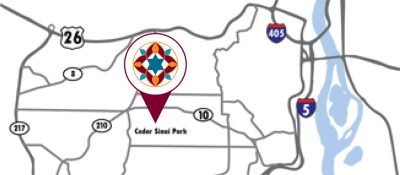Our Stories
Learn more about the people who live, work, and volunteer with us.
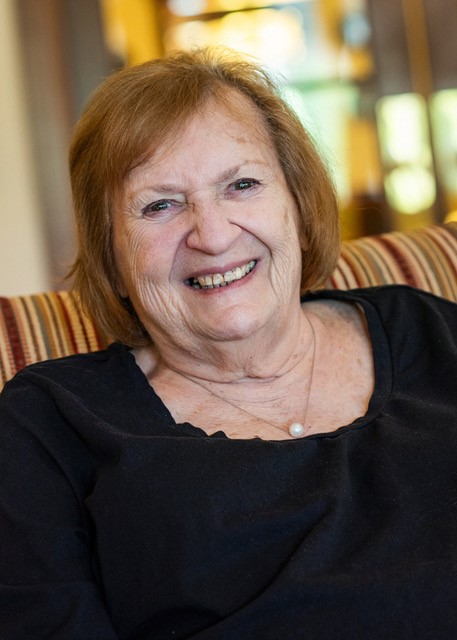
Myra Fox
Resident Council President Will Help Anyone
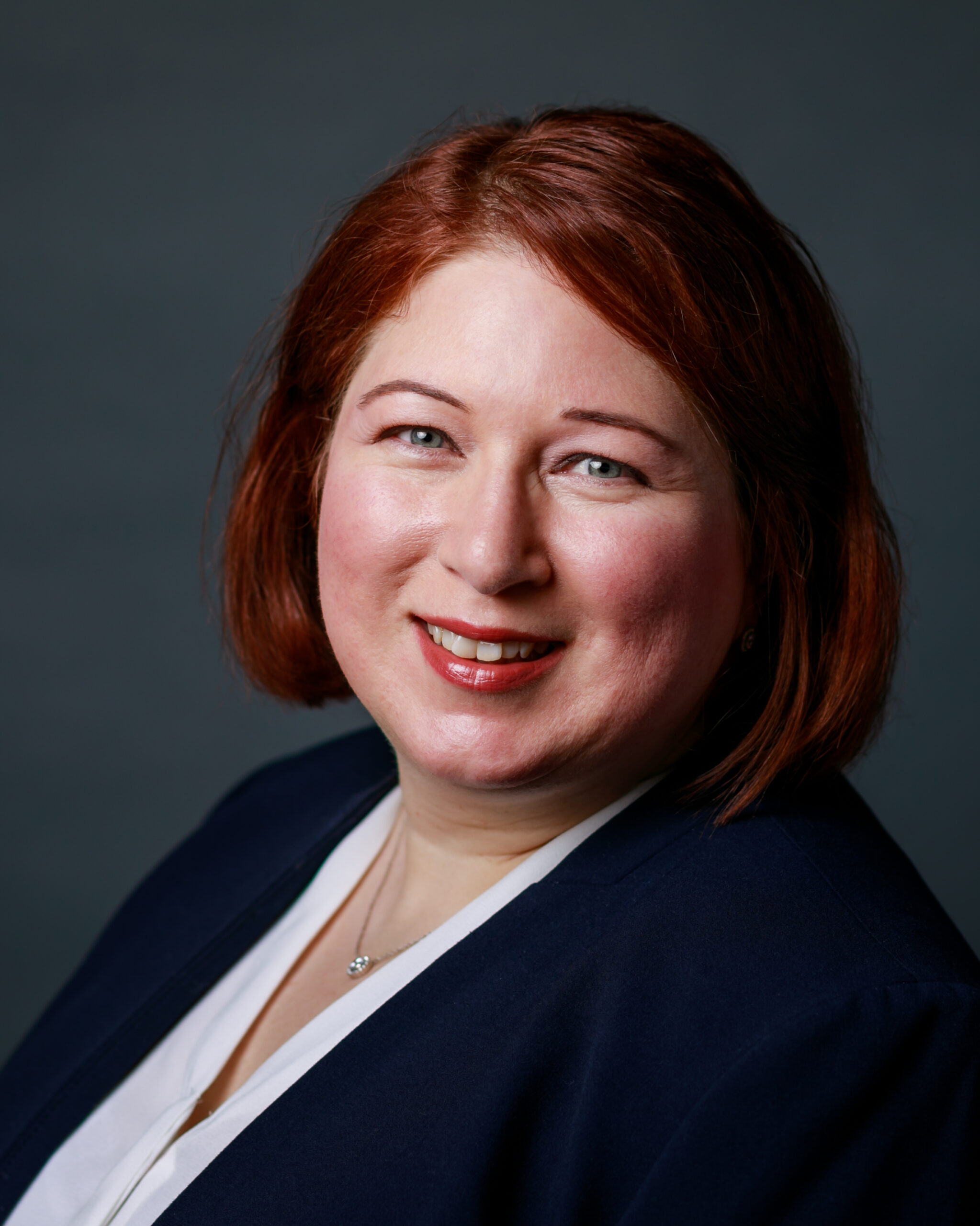
Geneva Jacobs Dougal
Supporting Staff and Residents
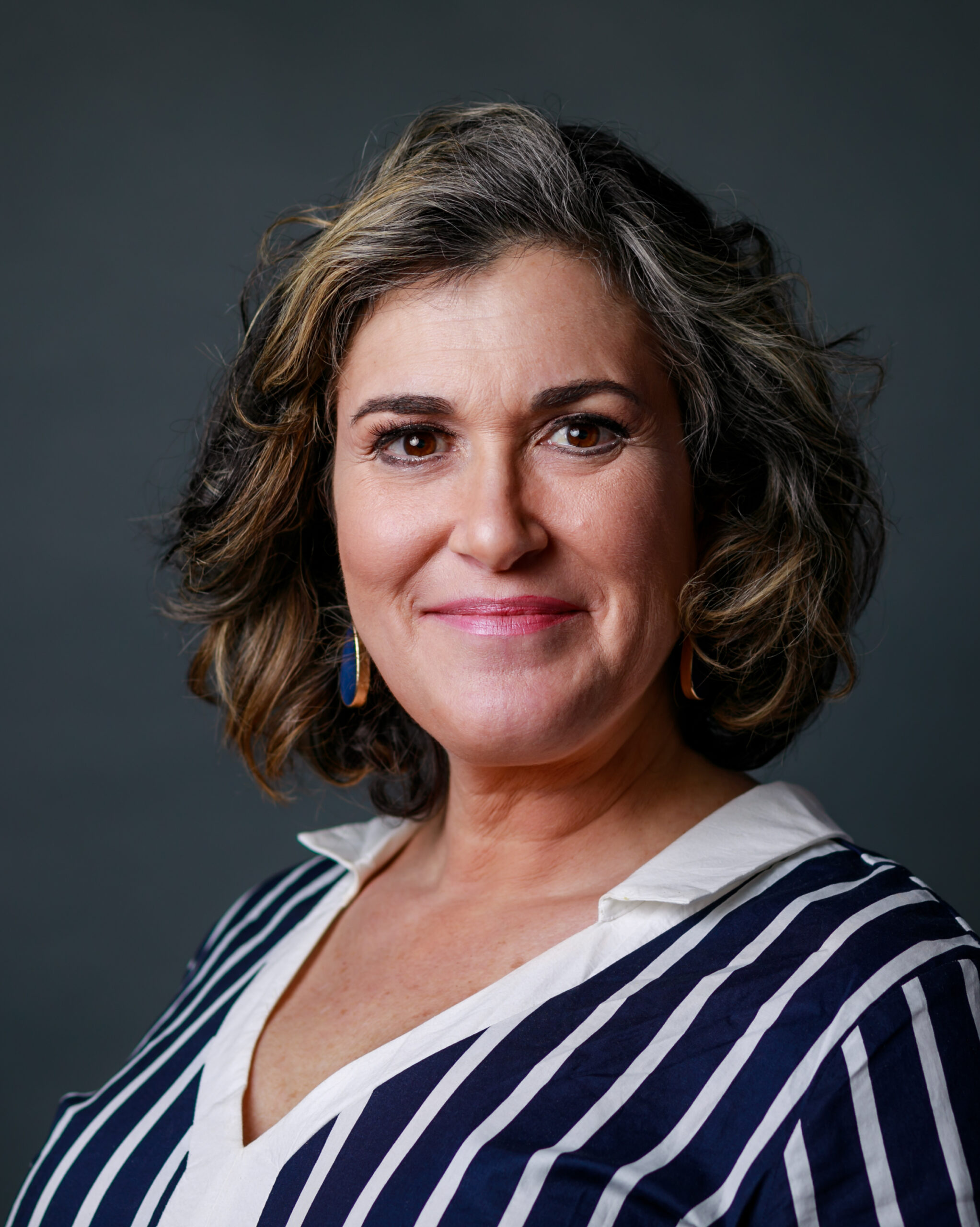
Jennifer Felberg
Loving Our Elders
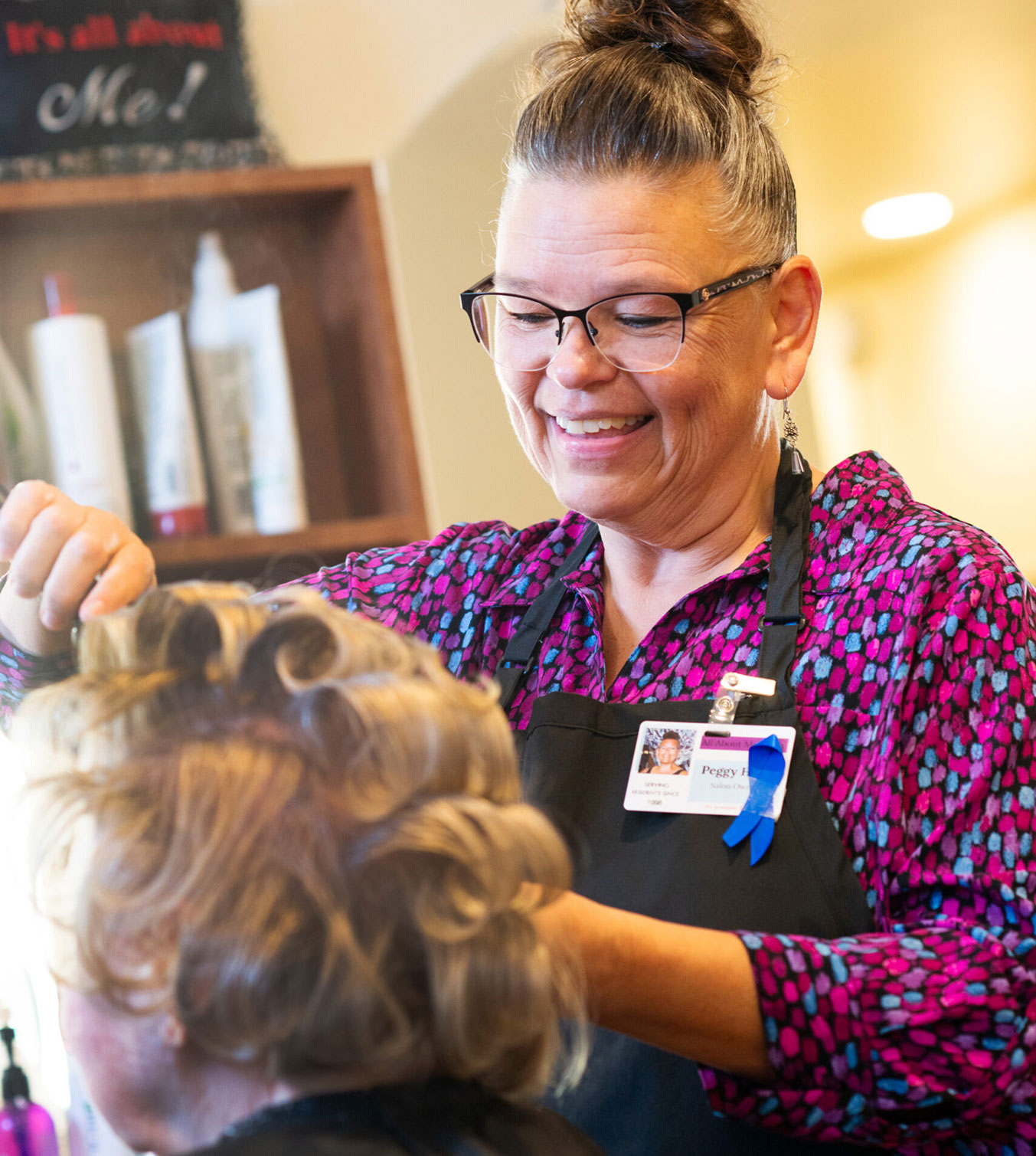
Peggy Henry
When you look good, you feel good

Andrea “Andy” Staggs
She Knows Food
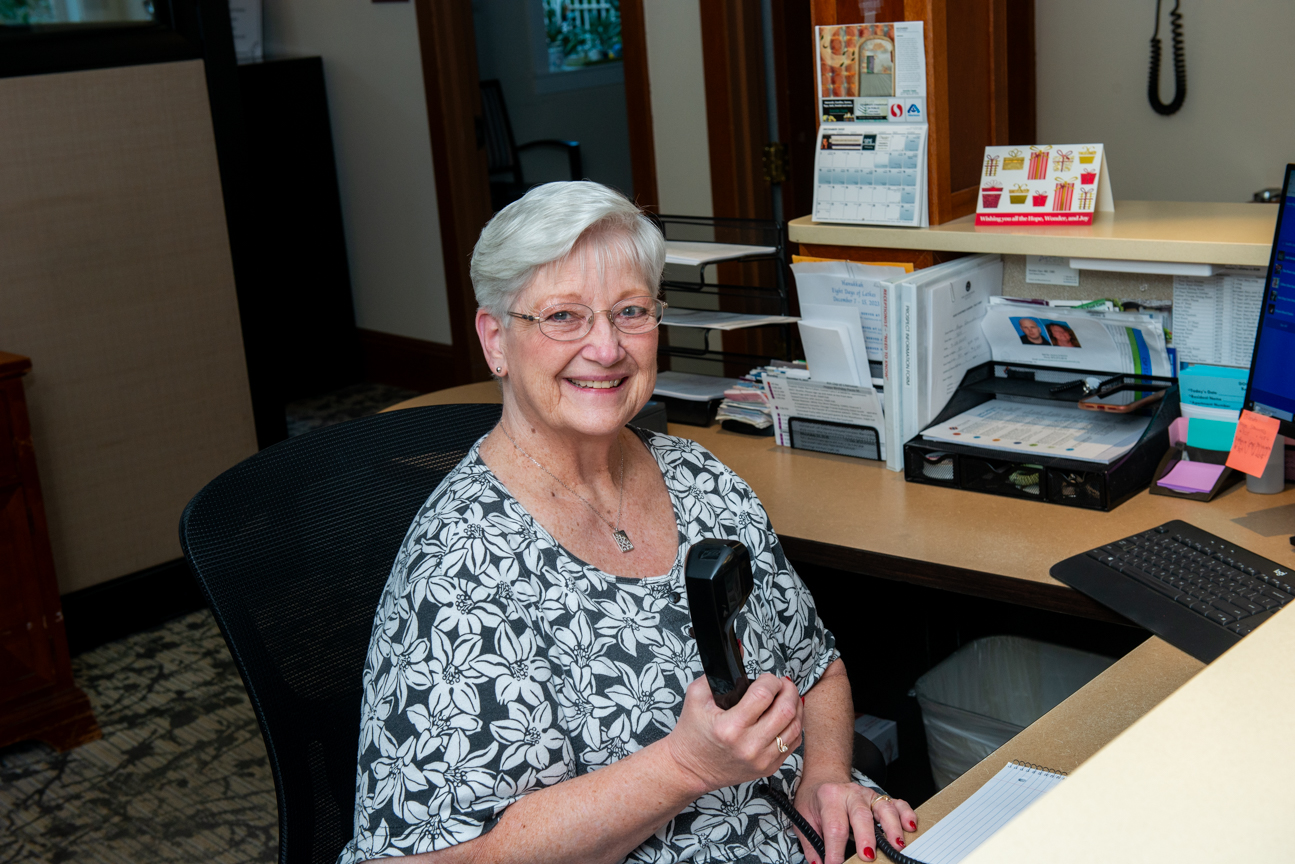
Leanna Anderson
She Cares for Others
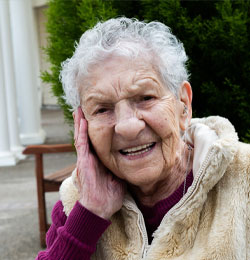
Sonia Liberman
She’s No Delicate Flower
Somehow, Kashemish always stayed three steps ahead of the Gestapo.Kashemish kept his word and somehow, “always stayed three steps ahead of the Gestapo,” Sonia reports. At his own peril, Kashemish shifted her from farm to farm and family to family throughout the War, a young, grammar-school-aged Jewish girl undercover, pretending to be a Christian. Sonia slept in the woods of the Black Forest, learned to gather milk and eggs from cows and chickens, moved quietly and quickly in the night, and was shuttled from convents to orphanages to worse—families dependent on her for grueling child labor but withholding all but an occasional crusty bread. Somehow, she survived. Yet once liberated following the war, her story did not become appreciably easier. As an orphan, she was transported through Czechoslovakia, Switzerland, Italy, and Germany, each in turn rejecting her and children like her, until she finally landed at an orphanage in France. Sonia ultimately made her way from there to Israel, finding distant relatives of her parents. As a young adult in then-Palestine, she met her future husband, soon married, went on to have three children, and eventually made her way to the United States with a growing family.
“I felt I have to survive.It would make sense if someone with Sonia’s history became embittered, distrusting, pessimistic. Instead, Sonia determined she had to bring good into the world. “I felt I have to survive,” she says. “I wanted to start my own family to replace the family I lost. I didn’t know how, I didn’t know if it would happen, but that was my plan.” Sonia had never learned to read and write as her would-be school years were all spent in hiding. But she learned. She received her bachelor of arts degree at University of Judaism the same year her son Gershon received his (aka Gary, Technical Services Director for Oregon State Hospital). “My father told me I would be a good teacher,” she says simply, “so that’s what I did.” She went on to acquire a master’s in Judaic Studies and became a one-woman Jewish teaching institution. She instructed day school and Hebrew School students for 50 years across Los Angeles. She moved to Portland in 2017 to be closer to Gary and his wife Esther (a bead artist and member of ORA Northwest Jewish Artists), and into Rose Schnitzer Manor. Instead of becoming cynical and disillusioned with humanity, Sonia’s dark youth intersected with a scrappy, discerning personality, tenaciously turning her into someone always seeking to be a mensch—a good human. “I am not the best person in the world,” she admits, “but I try to be good to people. G-d gave us good and bad,” she adds. “When I see someone who is homeless, for instance, I don’t judge. We are not better, smarter, than they are. We shouldn’t judge. We need to ask, ‘What happened to them to make them this way?’ There is always a reason,” she insists, having long been traumatized and homeless herself. Ever the master educator, Sonia now visits students at local high schools, sharing the history and truth of the Holocaust. She offers messages we would all do well to heed: “If you strongly believe in justice, fight for it. Stand up. Not with your fist—if you are able to do so, talk and reach resolution. Talk. You have to try. But,” she raises a finger as a caveat, insistent, “in Judaism you only have to ask forgiveness three times. If the third time someone is not willing to forgive you, that’s their problem, not yours!” She lives her words and has been known to “get in trouble” for ceaselessly defending others. She will take someone aside and tell them, “’That was not right, you embarrassed that person in front of other people. You should apologize. I will nag you until you apologize!’ And you know what? They do. They apologize!” “’Ima, do you have to fight so much for justice all the time?’” she says her son Gary asks her, “’Can’t you leave it alone, even sometimes?’” “I can’t,” Sonia confesses, shaking her head. “I am a human and I have rights too. if I am here in this world, I should at least speak up for those who can’t speak for themselves.”
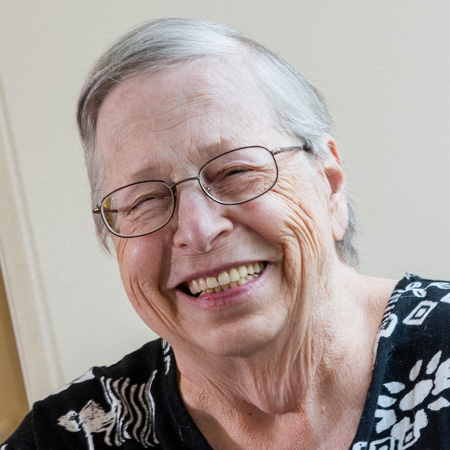
Marie Godfrey
It’s Doctor, Actually
If the walls at Rose Schnitzer Manor could talk, they might express surprise at a recent lecture in the May Living Room led by resident Marie Godfrey, Ph.D.
“Let’s start with our usual `Today in Genetics’ topic,” says Marie, cheerfully. “Today, it’s gene modification. You’ve probably heard the term GMO, or genetically modified organism. I’m talking about adding a vitamin D gene to a tomato. Perhaps we could replace the sun and vitamin pills with tasty tomatoes. As you know, part of my job is to introduce you to modern genetics and then explain why the idea is a waste of time and money.”
Marie’s rapt audience nods vigorously as she takes a breath.
This isn’t the sort of gathering you typically find at an independent and assisted living facility. But Marie is not a typical resident, nor is she a typical female of her generation.
She describes herself as one in a line of four strong women who take on whatever challenges are presented. Marie’s mother, daughter, and granddaughter are her stoic and resilient partners.
Marie St. Pierre was born in 1941 in Hartford, Connecticut, four days before Pearl Harbor; her brother was born “two years and eight months later on the same day of the month.”
She said her parents were “uneducated”—her mother was good at math but completed only the fifth grade to work on her foster parents’ farm—and her father ‘read a lot’ but mostly ‘junk Westerns.'”
The family was very poor, says Marie, living in a small house with no hot water and an oil stove for cooking. Some food was from unlabeled and dented cans gifted by the grocery store and produce about to be tossed. They also had a large garden.
As for school, “I was always told by my father, ‘Yeah, you got all A’s, but how often are you going to do that?’” says Marie. “It was always sort of a half compliment.”
Young Marie was quickly put into advanced classes, beginning with biology and chemistry. By the time she was in high school, her teachers recommended college. Unfortunately, tuition was $150 a semester and housing on campus was expensive.
“I begged and borrowed and all the rest of that kind of stuff to go to college and looked at a variety of schools, ending up at the Hartford branch of the University of Connecticut,” she said. “My father was dying of esophageal cancer at the time, so I needed to be near home.”
I wanted to do research. I told them, 'I don’t know what it is, but I’d like to do it!'
After her father died, Marie was taking a chemistry class and helping set up the lab when her teacher had a “mental breakdown” and she was asked to take over the labs. From this experience came an invitation to the main campus in Storrs. “When they agreed to pay tuition and other costs, I said I would go. I wanted to do research. I told them, I don’t know what it is, but I’d like to do it!” said Marie. That fall she moved to campus and was assigned a genetics teacher who was teaching graduate students. Meanwhile, she was developing a feistiness that seems to continue this day. Marie received her bachelor of arts in zoology in 1963. When Marie was asked where she was going to graduate school she replied, “Are you kidding?” A male colleague told her that he was registering her to attend Johns Hopkins, which at the time had only men in its undergraduate program. “In the graduate program, though, there were women,” she said. Funding was through United States government research programs. Her three-part doctoral thesis involved studying a mutation found by a fellow researcher at the National Institutes of Health. “I needed to insert a gene into the standard strain of Salmonella typhimurium to provide a marker for identifying the location and orientation of the histidine operon,” said Marie. “My mutation was at the beginning of the operon; it inactivated all 10 genes. The mutation disrupted a TAC nucleotide triplet, inactivating the turning on of the first gene—and nine others--in the operon.”I tried to get on the Vanderbilt faculty and could not. It turned out women weren’t allowed to be faculty if their husbands were faculty.At Hopkins, Marie and a friend helped establish a graduate club. It’s still in operation more than 50 years later. Music and food attracted many male attendees, she said; Marie met her future husband, Andy Godfrey, there. While preparing for her thesis defense in microbial genetics, one of Marie’s reviewers asked her if she was planning to “get married and have children instead of working,” an allowable question back in the day. “Women were still a minority, an under-recognized group even at Hopkins,” Marie said, and then with her wry understatement added: “It was an interesting time.” After completing her doctoral degree, Marie did a one-year post-doc at Princeton University, working with a spore-forming microorganism. She and Andy were married in 1968 and moved to Nashville where Andy taught geology at Vanderbilt, and Marie accomplished a second post-doc year. “I tried to get on the Vanderbilt faculty and could not,” said Marie. “It turned out women weren’t allowed to be faculty if their husbands were faculty. I finally ended up getting a staff job helping teach a bacteriology laboratory for nurses and eventually replacing the instructor of a laboratory course in molecular biology.” Marie and Andy collaborated on a water contamination project in the Cumberland River that was published in the local paper. When someone else was tapped for the geology tenure position, they moved to Utah, where Andy worked for the U.S. Forest Service and Marie served as a volunteer educator for the American Cancer Society. This was the beginning of a 38-year life in Utah. “It was different,” said Marie, who had two daughters during this time. “There were no colleges nearby so there was no place I could teach. And I couldn’t teach in the local schools because I had a higher degree than other teachers or the principal. And, I wasn’t Mormon.” Marie spent a summer in southern Utah earning a secondary teaching certificate, and was later a substitute chemistry, and math, and English distance learning high school teacher. She taught night school at the local technology school and asked to teach advanced placement biology when she realized that the person instructing her daughter “had no idea what he was doing.” Later, she worked as the director of a women’s shelter, Girl Scout leader, and board secretary.On a trip to Portland for a triennial meeting, “I was introduced to Saturday Market,” said Marie. “I really liked the place and I found Portland safer than Salt Lake City.” Finally in a real city in Utah, she began writing for pharmaceutical companies and traveled frequently in the United States and Europe. In her job as medical writer and department director, she wrote clinical trial reports and summary documents for marketing applications for a variety of companies and drugs. Both of Marie’s daughters selected colleges in Oregon, married, and made homes in Portland. When Andy died in 2006 from a brain tumor, Marie bought a house here and finally made it back to Portland. Marie moved into Rose Schnitzer Manor in the fall of 2018 where cats Cricket and Panther were also welcomed. “There are a lot of activities here that people attend. People here are more likely to be educated than other places I investigated,” she said. “I didn’t know much about Judaism, so I studied the Torah for two years. As far as I’m concerned, religion is your own choice, and now that I know why certain traditions are done, I can understand them.” “I also learned that Jews love to argue,” said Marie, throwing her head back with a loud chuckle, “and that was good for me. The attitudes toward people and the variety of people here are much healthier than the other faiths that I’ve been near, and I like the fact that people are not judgmental.” Marie has found Covid and its virus fascinating to study and calls it the “smartest living un-living thing I’ve ever run across.” She challenges the misinformation about the Covid vaccines and includes information in her discussions with friends and those in the genetics class. In addition to teaching basic genetics to the Rose Schnitzer Manor residents, Marie is in the choir. She has been on the Resident Council. And in May 2022, she spoofed Cliff from the television show “Cheers” wearing a favorite t-shirt: “Never Underestimate a Woman with a Doctoral Degree.” “I love to talk,” she said. “I always say to new people, `I’m known as Marie who talks a lot.’ The first time I heard that, the other person finished by taking a breath. And then said, “but she’s really intelligent.” She appreciates that view.
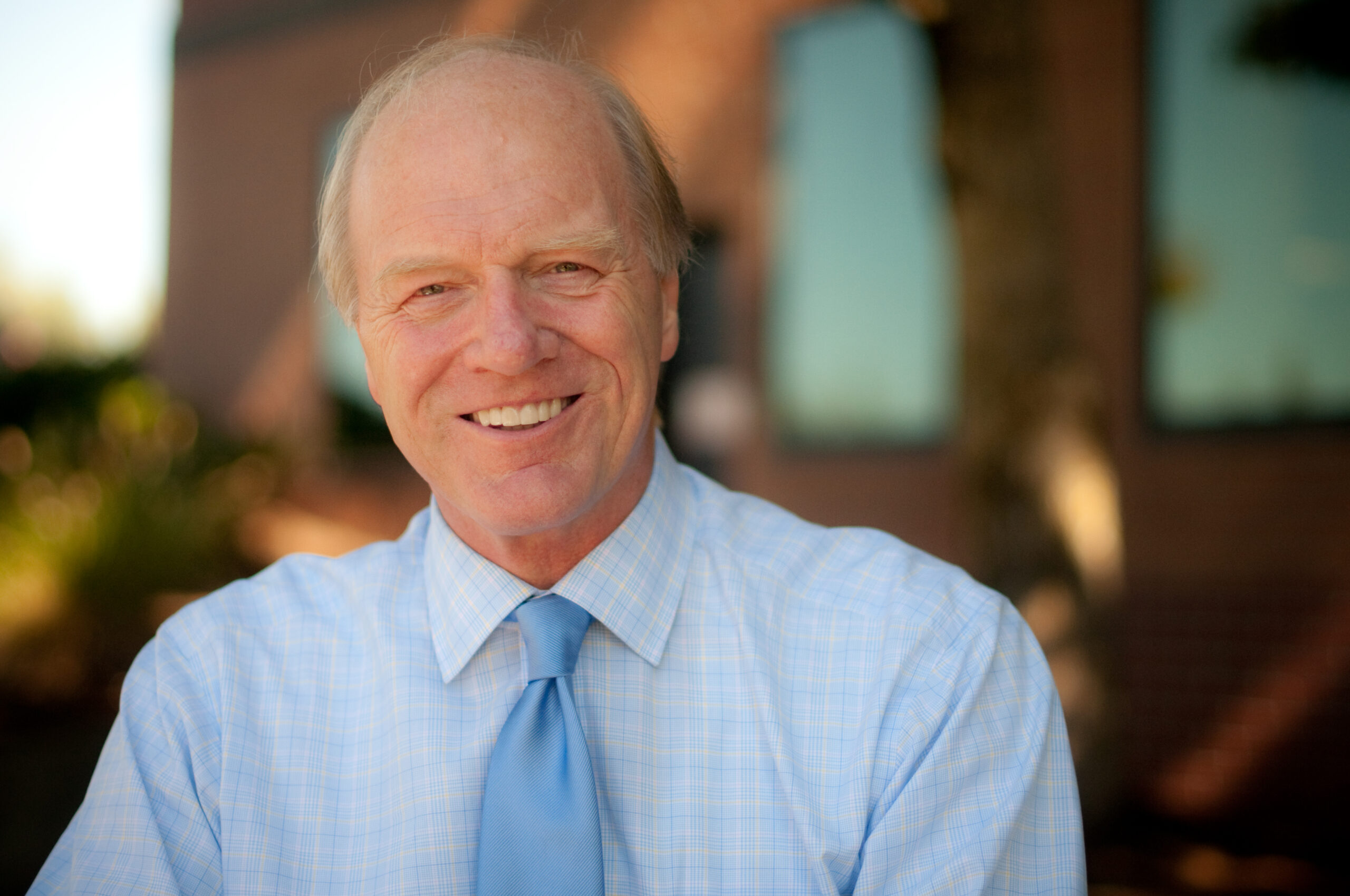
Steve Rallison
Cedar Sinai Park Board Chair
The fifth commandment of loving our fathers and mothers is one I take very seriously.Steve was born in Utah, and moved to Oregon as a young boy in 1957. He has a bachelor of science in sociology from Brigham Young University, and a master’s of health administration from Washington University in St. Louis. His 30-plus years of healthcare experience include leading large hospitals in Illinois and Michigan, leading a large multispecialty group practice in Minnesota, and consulting throughout the United States. “I have gone into some exceedingly difficult situations where key people have died or there have been embezzlements or other cases where organizations have lost their way financially or strategically and no one knows what to do,” said the becalming Steve. “I come in and get things settled down and then get everyone focused and aligned so the organization can move forward.” That background is how Steve believes he can help Cedar Sinai Park. “Cedar Sinai Park is unique in today’s world where most assisted living and long-term care homes are owned and operated by for-profit corporate entities whose headquarters dictate what and how things are done. What a great tribute it is to the Jewish community of Portland for its continued support to get us this far! But we cannot be stuck in the wonderful events of the past to move forward. “We want Cedar Sinai Park to become the preferred place for people and families who need the services we offer; the light on the hill, if you will. We are guided by the fifth commandment to honor our parents and also the commandment to love our neighbors, and we have the found of our Jewish legacy and the desire and will to be a leader in delivering senior services that are unparalleled in the Portland area.
Cedar Sinai Park is unique in today’s world where most assisted living and long-term care homes are owned and operated by for-profit corporate entities whose headquarters dictate what and how things are done.To become that preferred place, Steve said steps must be taken to improve financial stability and sustainability. “Our priorities are to find and retain staff, improve occupancy, improve data, make strategic forward-thinking decision, and build a culture of community. We have the staff and management to make this happen.” Steve believes the culture of community, especially, is key for a vibrant future for the organization. “When you look at the changing world and not just the change in demographics, it’s how we are all aging and what we expect out of our aging experience. None of us want to be institutionalized. We all want to have the opportunity to express ourselves, and to continue achieving our life goals. We want to feel connected, be known, and feel part of a community. “What we have to do is create a culture that is so welcoming that it validates who you are and what you want to accomplish at this stage of your life. We aren’t going to compete with other places that may have shiny buildings or amenities. But we can be a place people choose because of the meaningful interconnections made with the staff, the families, and everybody in the community. Steve and Sharon have 14 grandchildren, nine in Israel. They are avid hikers and bikers and like to take road trips with “binoculars, bird guides, and bird watching apps” on their phones. Steve also likes to garden and harvests fruit and vegetables for his neighbors. He consults occasionally, but most of the time he is engaged in interfaith activities. He is also on the board of Black Men IN Training. “I am committed, on behalf of the board of trustees, that we will put forward our best efforts as stewards of Cedar Sinai Park to work closely with management team staff, residents, and families to move us forward in the coming fiscal year,” said Steve. “I hope that our community will engage with us to be part of the culture of community as future board members, as residents, volunteers, donors, or friends of Cedar Sinai Park. We welcome everyone’s voice and involvement. “We are all in charge of the destiny of Cedar Sinai Park.


